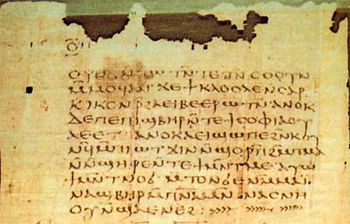Category:Apocalypse of Peter (text)
Apocalypse of Peter (see online text) is an early Christian document, attributed to Peter and now preserved among the NT Apocrypha.
Overview
The complete text is lost. We now know it only from certain quotations made by writers of the first four centuries and from two large fragments, one in Greek and the other in Ethiopic.
The Greek manuscript was discovered during excavations directed by Sylvain Grébaut during the 1886–87 season in a desert necropolis at Akhmim in Upper Egypt. The incomplete fragment consisted of parchment leaves of the Greek version that was claimed to be deposited in the grave of a Christian monk of the 8th or 9th century. The manuscript is in the Coptic Museum in Old Cairo.
The Ethiopic version (also incomplete) was first discovered in 1910. There are several manuscripts on the Ethiopic version.
Some major themes
The book presents itself as the vision received by Peter at the event of the Transfiguration of Jesus. The presence of Peter]] at that event was recorded in the Synoptics and stated in 2 Peter ("we had been eyewitnesses of his majesty. 17 For he received honor and glory from God the Father when that voice was conveyed to him by the Majestic Glory, saying, "This is my Son, my Beloved, with whom I am well pleased." 18 We ourselves heard this voice come from heaven, while we were with him on the holy mountain," 2 Peter 1:16-18)
As in Revelation, the divinity of Jesus is now stressed.
“My Lord and God Jesus Christ” (16)
The vision focuses on the description of the Last Judgment:
“Then shall they all behold me coming upon an eternal cloud of brightness; and the angels of God who are with me shall sit up the throne of my glory at the right hand of my heavenly Father; and he shall set a crown upon my head. And when the nations behold it, they shall weep, every nation for itself” (ch. 6).
As in all description of the Last Judgment, the separation between the righteous and the wicked is done according to their deeds.
As usual, the major sins are idolatry, murder and fornication (porneia).
As in 2 Peter, the emphasis on God’s Mercy does not annul the reality of God’ Justice.
External links
Pages in category "Apocalypse of Peter (text)"
The following 8 pages are in this category, out of 8 total.
1
- Evangelii secundum Petrum et Petri apocalypseos (The Gospel of Peter, and the Apocalypse of Peter / 1892 Lods), book
- The Gospel according to Peter, and the Revelation of Peter (1892 Robinson, James), book
- Das Evangelium und die Apokalypse des Petrus (The Gospel and the Apocalypse of Peter / 1893 Gebhardt), book
- Bruchstücke des Evangeliums und der Apokalypse des Petrus (Fragments of the Gospel and the Apocalypse of Peter / 1893 Harnack), book
- L'Évangile et l'Apocalypse de Pierre, avec le texte grec du livre d'Hénoch (1893 Lods), book
- Diverbium salutis (1995 Schoenborn), book
